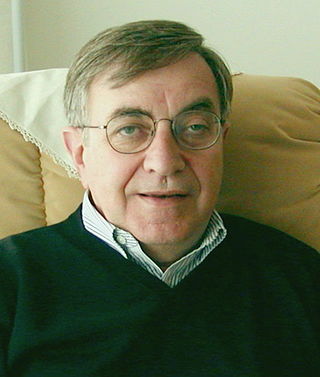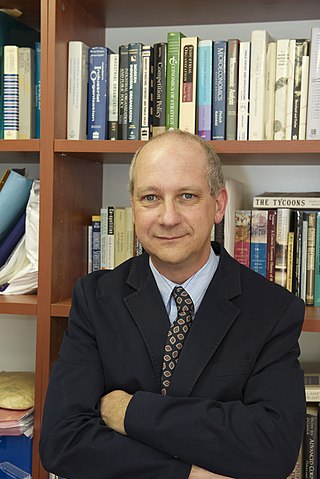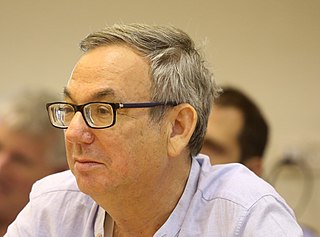
Economic growth can be defined as the increase or improvement in the inflation-adjusted market value of the goods and services produced by an economy in a financial year. Statisticians conventionally measure such growth as the percent rate of increase in the real gross domestic product, or real GDP.
Evolutionary economics is part of mainstream economics as well as a heterodox school of economic thought that is inspired by evolutionary biology. Much like mainstream economics, it stresses complex interdependencies, competition, growth, structural change, and resource constraints but differs in the approaches which are used to analyze these phenomena. Some scholars prefer to call their evolutionary theory by a different names. Samuel Bowles named it "evolutionary social science" and Joachim Rennstich called it "evolutionary systems theory".
Nancy Laura Stokey has been the Frederick Henry Prince Distinguished Service Professor of Economics at the University of Chicago since 1990 and focuses particularly on mathematical economics while recently conducting research about Growth Theory, economic dynamics, and fiscal/monetary policy. She earned her BA in economics from the University of Pennsylvania in 1972 and her PhD from Harvard University in 1978, under the direction of thesis advisor Kenneth Arrow. She is a Fellow of the Econometric Society, the American Academy of Arts and Sciences and the National Academy of Sciences. She previously served as a co editor of Econometrica and was a member of the Expert Panel of the Copenhagen Consensus. She received her Honorary Doctor of Laws (L.L.D) in 2012 from the University of Western Ontario. Much of her work has been done by digesting economic dynamics, which most of this work is done as an expositor. She spent a great deal of time recently researching growth theory, economic dynamics, as well as fiscal and monetary policy.
Robert Joseph Barro is an American macroeconomist and the Paul M. Warburg Professor of Economics at Harvard University. Barro is considered one of the founders of new classical macroeconomics, along with Robert Lucas, Jr. and Thomas J. Sargent. He is currently a senior fellow at Stanford University's Hoover Institution and co-editor of the influential Quarterly Journal of Economics.

The overlapping generations (OLG) model is one of the dominating frameworks of analysis in the study of macroeconomic dynamics and economic growth. In contrast, to the Ramsey–Cass–Koopmans neoclassical growth model in which individuals are infinitely-lived, in the OLG model individuals live a finite length of time, long enough to overlap with at least one period of another agent's life.

Elhanan Helpman is an Israeli economist who is currently the Galen L. Stone Professor of International Trade at Harvard University. He is also a Professor Emeritus at the Eitan Berglas School of Economics at Tel Aviv University. Helpman is among the thirty most cited economists in the world according to IDEAS/RePEc.
Oded Galor is an Israeli-American economist who is currently Herbert H. Goldberger Professor of Economics at Brown University. He is the founder of unified growth theory. Galor has contributed to the understanding of process of development over the entire course of human history and prehistory, and the role of deep-rooted factors in the transition from stagnation to growth and in the emergence of the vast inequality across the globe. Moreover, he has pioneered the exploration of the impact of human evolution, population diversity, and inequality on the process of development over most of human existence.
The Review of Economic Studies is a quarterly peer-reviewed academic journal covering economics. It was established in 1933 by a group of economists based in Britain and the United States. The original editorial team consisted of Abba P. Lerner, Paul Sweezy, and Ursula Kathleen Hicks. It is published by Oxford University Press. The journal is widely considered one of the top 5 journals in economics. It is managed by the editorial board currently chaired by Nicola Fuchs-Schündeln. The current joint managing editors are Thomas Chaney, Andrea Galeotti, Nicola Gennaioli, Veronica Guerrieri, Kurt Mitman, Francesca Molinari, Uta Schönberg, and Adam Szeidl. According to the Journal Citation Reports, the journal has a 2020 impact factor of 6.345.

Katharina Galor is a German-born Israeli art historian and archaeologist specializing in Israel-Palestine. She has been teaching at Brown University since 1998, where she is Hirschfeld Visiting Associate Professor of Judaic Studies and Visiting Associate Professor of Urban Studies.
Demographic economics or population economics is the application of economic analysis to demography, the study of human populations, including size, growth, density, distribution, and vital statistics.

Frank Horace Hahn FBA was a British economist whose work focused on general equilibrium theory, monetary theory, Keynesian economics and critique of monetarism. A famous problem of economic theory, the conditions under which money, which is intrinsically worthless, can have a positive value in a general equilibrium, is called "Hahn's problem" after him. One of Hahn's main abiding concerns was the understanding of Keynesian (Non-Walrasian) outcomes in general equilibrium situations.

Jean-Paul Fitoussi was a French economist and sociologist of Sephardi Jewish descent.
The Journal of Economic Growth is a peer-reviewed academic journal covering research in economic growth and dynamic macroeconomics. It was established in 1996 and is published by Springer Science+Business Media. The journal deals with both theories and their empirics, and examines the entire array of subject areas in economic growth, including neoclassical and endogenous growth models, growth and income distribution, human capital, fertility, trade, development, migration, money, the political economy, endogenous technological change, overlapping-generations models, and economic fluctuations.
Don Patinkin was an American-born Israeli monetary economist, and the President of the Hebrew University of Jerusalem.

The Barcelona Development Agenda is a statement of development principles formulated as a response to the prevailing Washington Consensus development model. Resulting from the collaboration of economists from both developing and developed countries at the 2004 Universal Forum of Cultures in Barcelona, Spain, the Barcelona Development Agenda outlines seven lessons learned from previous policy failures and successes, and presents them as priorities for future economic reforms. The principles emphasize a balance of market and government economic roles, flexible economic tools, and an increased role for sustainability and equity in governance.

Aix Group is a French-Israeli-Palestinian-international economic study team hosted by the Université Aix-Marseille (AMU) in the region of Provence-Alpes-Côte d'Azur in the South of France in coordination with the DATA Center for Studies and Research in the Palestinian Authority, the Harry S. Truman Institute for the Advancement of Peace in Jerusalem and, until 2015, the Peres Center for Peace in Israel and. Their aim is to inform policy makers of the economic costs of the Israeli–Palestinian conflict, as well as to provide policy makers with economic solutions towards a two-state solution, and detail how each could benefit by improving economic cooperation.
The Galor-Zeira model is the first macroeconomic model to explore the role of heterogeneity in the determination of macroeconomic behavior. In contrast to the representative agent approach that dominated the field of macroeconomics till the early 1990s and argued that heterogeneity has no impact on macroeconomic activity, the model demonstrates that in the presence of capital markets imperfections and local non-convexities in the production of human capital, income distribution affects the long run level of income per-capita as well as the growth process.

Yishay Yafeh is an Economist and a Professor of Finance at the Hebrew University of Jerusalem School of Business Administration in Israel. Between 2010–2012 he was the vice- dean of the Hebrew University School of Business Administration and the Dean of the School between 2012–2016.

Eran Yashiv is an Israeli economist and policy advisor. His research focuses on topics of macroeconomics, including the labour market and business cycles. More specifically, he is interested in the connections between the value of labour and the value of the firm.
Yu-Chin Chen is an economist and researcher at the University of Washington. Her research fields include international finance, macroeconomics, open economy macroeconomics, trade and development, and applied economics. She has served as a staff economist for the Clinton administration and is currently an economics professor at the University of Washington. Classes she teaches include Macroeconomic Analysis, International Financial Monetary Economics, and Computational Finance and Financial Econometrics.









